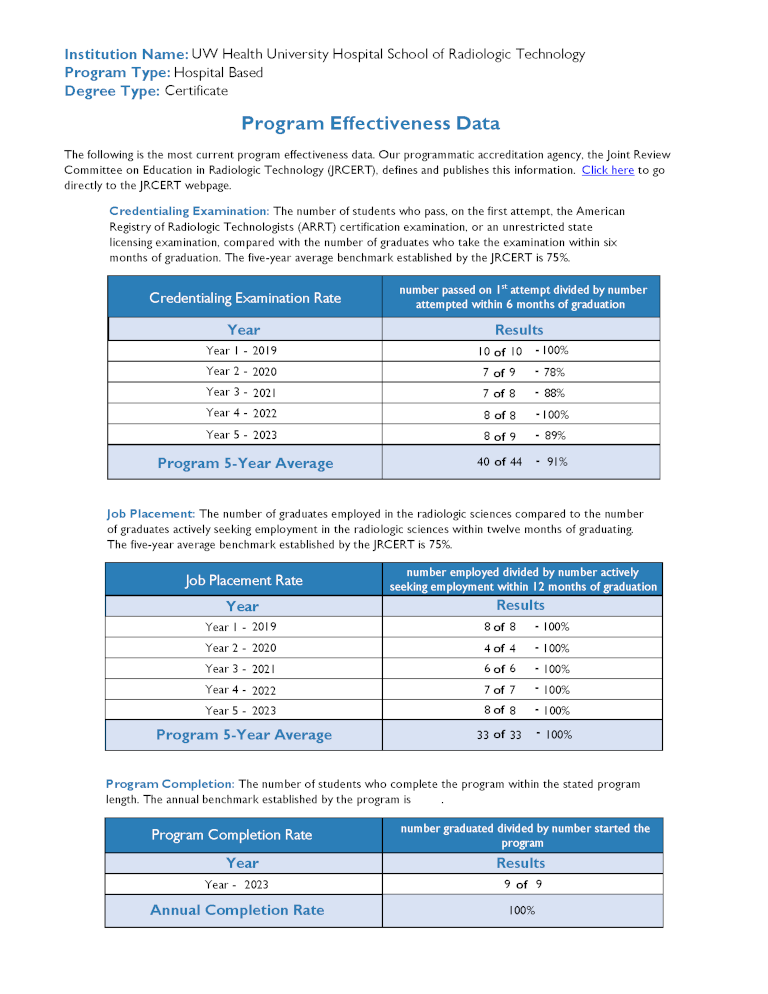Applicants must submit a $50 processing fee with their application into the program.
Enrollment fee
Applicants accepted to the UW Health University Hospital School of Radiologic Technology must submit a $100 enrollment fee to hold their place in the class for which they are accepted. The due date of this fee will be stipulated by the School in the letter of acceptance.
Applicants who do not submit the enrollment fee by the stated deadline will forfeit their enrollment and an alternate applicant will be offered their place in the coming class. The enrollment fee is non-refundable.
Tuition
The amount of tuition each student pays is determined by the respective university affiliate. Students make tuition payments directly to their respective college or university. Contact the bursar’s office at the respective university affiliate for the most current information regarding tuition charges. Students will also be asked to register and pay a $40 fee for My Clinical Exchange each year for clinical scheduling and document tracking.
All tuition and fees must be paid in full before a student will be granted a certificate of completion and ARRT Certification Examination eligibility.
Textbooks
Textbooks and online resources required for the program are available through Elsevier Publishers. The publisher works with the program to offer a specially designed textbook and resource package at a significant discount. A list of required textbooks and online supplements will be issued to students when they enroll in the program.
Cost of textbooks and online supplements varies each year due to publisher pricing. Students can expect to pay approximately $1,500 for textbooks and online supplements during the two years of professional study.
Refunds
Tuition refunds are handled according to the guidelines of the respective college or university.
Housing
Housing is the responsibility of the student. It is recommended that students live in the Madison area. The program advises students to be cognizant of program start and end dates when negotiating and signing leases.
The University of Wisconsin Campus Assistance Center can aid students in locating rental housing (houses, apartments, boarding houses and rooms in private residences).
UW Campus Assistance Center
University of Wisconsin-Madison
1308 W. Dayton St.
Union South
Madison, WI 53715
(608) 263-6400
Meals
Students are responsible for their own meals.
Attire
Radiologic Technology students are expected to abide by a professional dress code. The cost of appropriate professional attire is the responsibility of the student. Costs for professional attire can vary widely, but students can expect to pay $200-300 for professional attire during the two years of clinical study.
Student attire shall consist of maroon/wine or light gray scrub suit, white lab coat (optional, but recommended) and athletic shoes or surgical clogs (white, black or brown are acceptable colors). Footwear must cover the entire foot.
Health insurance
Students are responsible for their own health insurance. It is required that students carry personal health insurance while in the program. Proof of insurance is required by the program.
UW Health Employee Health Services will treat students who become ill or injured while on clinical duty.
Students using UW Health Emergency Services for medical treatment will be billed for those services through the student’s personal insurance.
Health services should be obtained by a provider covered by the student’s personal health insurance.
Students who do not have health insurance are encouraged to obtain coverage through the Affordable Care Act.
Mental health services are available through the student’s personal insurance or through these resources:
Financial aid
The UW Health University Hospital School of Radiologic Technology does not sponsor or award financial aid. Students may apply for financial aid programs available at their respective college or university.
Sample of annual costs for first-year SRT students
Tuition: Approximately $12,284 (full-time Wisconsin resident student rate)
* The amount in the example above is representative of 2022-2023 tuition charged by UW-Milwaukee and considers three semesters’ worth of tuition payments. Please note that tuition is paid directly to the student’s university affiliate and will be based on the tuition rates in effect at that university.
Textbooks and supplies: $1,500
Professional attire: $200-$300

